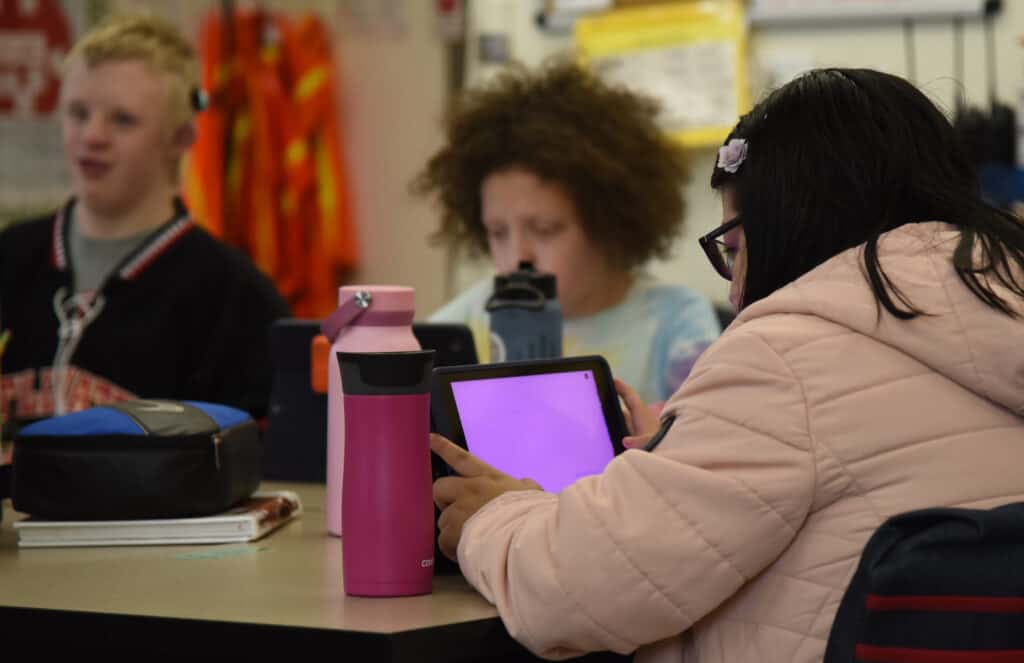
It’s a Thursday afternoon, and two Mead High School student mentors are chatting with a special education student about her favorite movie. Talking about movies may seem like a typical thing for high school students to do while they’re waiting for the bell to ring, but for many students with disabilities, engaging in conversation is a skill that can be challenging.
At Mead High School, general educators, special education teachers, and administrators work together to foster an inclusive learning environment where students with and without disabilities attend classes together. This provides students with opportunities to establish relationships with their peers, resulting in improved academic outcomes and a sense of belonging. It encourages social interaction, which helps students with disabilities develop their communication skills.
“The staff here is amazing, and the students are amazing,” said Mead Special Education teacher Amber Vanzant. “I think, in general, this is just an accepting school. Our PE teachers created a unified PE class, our previous band director started unified percussion, and both of them came to me. I didn’t have to go to them and ask what we could do to make things more inclusive. They put forth a lot of effort to make everyone feel included.”
Mead’s Unified Sports program provides students with and without disabilities the opportunity to participate in after-school sports such as basketball, soccer, and bowling. Students with disabilities are paired with general education students who serve as their peer mentors and supporters on the field or court. Playing on the same team together promotes social inclusion, teamwork, and sportsmanship.
Not only does the Unified Sports program create an environment where disabled and non-disabled students develop strong friendships, it also gives parents a way to develop relationships with other parents, which in turn extends students’ relationships beyond the classroom. According to Vanzant, “Unified sports helps parents make connections as well. Students will end up doing things outside of school, like birthday parties. It’s helpful that those extracurricular activities get parents together, talking, and connected.”
The Unified Percussion Ensemble at Mead gives students with disabilities the chance to learn music and be part of the band. Students in the program work with the band director, a special education paraprofessional, and student mentors who have previous ensemble experience. The ensemble performs at various events throughout the year, including football games, pep rallies, St. Vrain Valley Schools Band Night, and more.
When it comes to academics, students with less significant disabilities attend general education classes with the support of a special education teacher. Students with more significant disabilities attend their core classes in a special education classroom taught by Vanzant and take their electives in general education classrooms with the support of a paraprofessional.
Student mentors in the classroom provide guidance that helps students with disabilities integrate into high school life and succeed both academically and socially. “Students with disabilities are just like every other teenager, and they would rather listen to their peers than their teachers and parents. It’s definitely more impactful to hear one of your peers tell you when something is appropriate or not. We utilize peers a lot for those purposes,” said Vanzant.
Vanzant’s special education class goes out into the community regularly to practice interacting with people and work on growing their independence and social skills. Many times, student mentors will go along to provide support. “It’s nice to have them there to support conversations because some kids struggle with how to maintain a conversation. It’s helpful when peers are there to pull that out of them,” said Vanzant.
To build a strong connection with her students, Vanzant treats them like everyone else. “I’ve got them for four years, so we build really strong relationships, and it starts with listening to them. I talk a lot about my family because that’s an important way to make connections, and it also gives them an opportunity to ask questions,” said Vanzant. “I figure out what they’re good at and work on making them better at it. The biggest piece is building that self-confidence and helping them feel like they’re important, smart, and valuable. Once that comes, they start blooming and maturing.”
Administrators at Mead High School have always been supportive of the special education program and students with disabilities. They know the names of all the students and regularly stop by the special education classroom to say hello. Vanzant is very outspoken about what her students need and deserve, and she’s purposeful about making sure they’re visible in the school. She wants them to be noticed in a positive way, and regularly shares their successes because it’s important for everyone to feel like they’re a valuable member of the school community.


